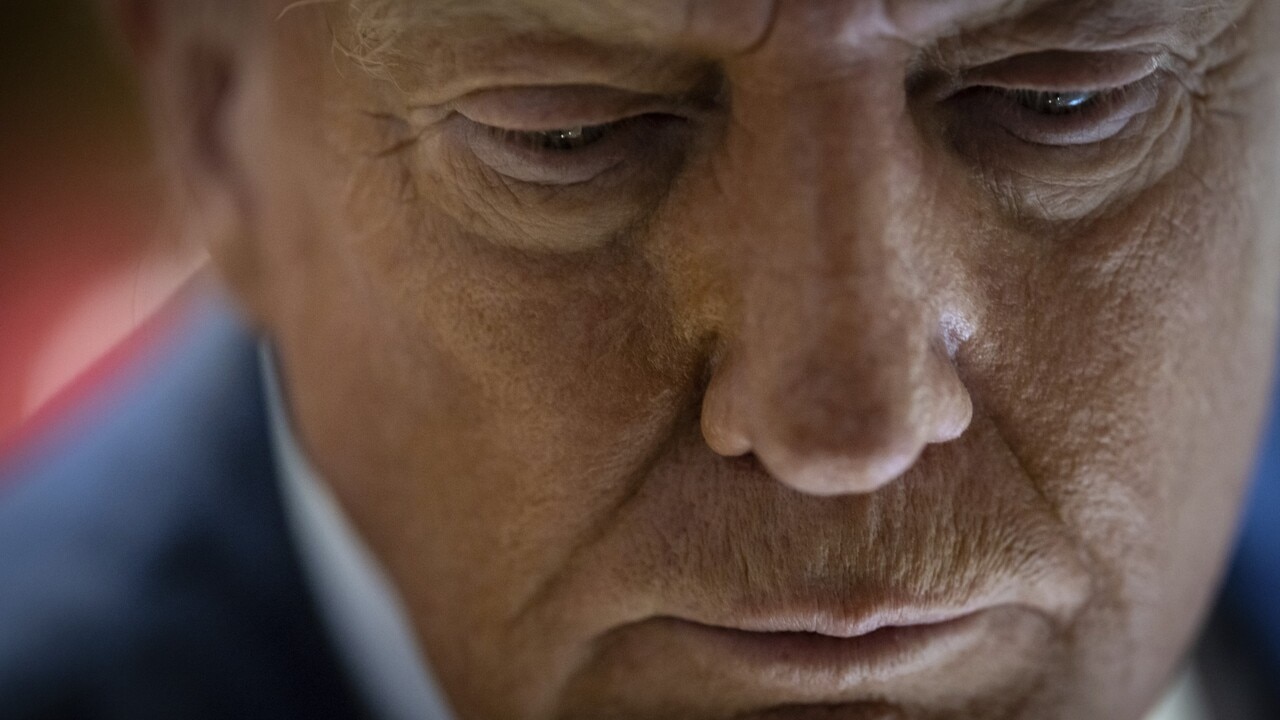How Donald Trump’s trade tariffs will change the path of interest rates in Australia
Much of the global tariff fight is set to take place between China and the US, but it has major implications for Australia.

Australia is at risk of coming out second-best to Donald Trump’s America First policy, with fallout from a blanket tariff imposition having the potential to deliver a bigger-than-expected hit to the local economy.
However, a Trump presidency is not all bad news – particularly for homeowners.
The Reserve Bank of Australia could be forced to respond to the impact of the sweeping tariffs, with a rapid fire round of interest rate cuts.
That’s the view of influential Goldman Sachs Australia economist Andrew Boak, who is meeting with clients this month to discuss the economic landscape for the coming year.
Most of the global tariff fight is set to take place between China and the US, which Boak expects will mean slower exports sales for China and therefore slower growth for Asian giant. And Australia’s fortunes are directly tied to China given our trade links.
“The growth hit is real, and it is there,” Boak says.

The Goldman economist’s base case is the RBA cuts its cash rate as early as February. Then it follows through with a cut every quarter through the next calendar year until it hits the terminal (or neutral) rate of 3.25 per cent by November. Most economists are tipping May as the first cut and then a more cautious path to cutting for the rest of the year.
His comments come as financial markets are slowly reassessing the longer-term impact of a Trump presidency. Any much of that is around inflation coming back.
Wall Street has given up most of its 4 per cent sugar hit rally from Trump’s win this month. And now US bond markets are behaving more cautious over the outlook for inflation over concerns of a big-spending Trump, a major tariff push and even mass deportations, all fuelling inflation again.
The incoming US president has promised to push ahead with a blitz of tariffs of between 10 and 20 per cent on everything and slap China with 60 per cent on all goods. There could be room for negotiation on some goods, and Boak thinks China’s tariffs will average at 20 per cent.
A string of Australian chief executives have said the tariff plan will be disruptive for global trade, although there is a great deal of uncertainty about what the final shape of the tariff policy will look like. NAB boss Andrew Irvine this month said Trump’s tariff plan could have “global ramifications and ramifications for Australia”.
On Friday, US bond yields surged as Federal Reserve chair Jerome Powell said he was in no hurry to cut interest rates there, noting a “bumpy” path ahead for inflation. The rising yields in recent weeks has a real impact on the borrowing costs of business.
Boak argues the net impact on Australia of the Trump tariffs and taking into account a domestic stimulus response from China is a negative for growth in Australia to the tune of about 20 basis points in the coming year.

Australia is still in for a mild slowdown to persist next year, with Boak expecting GDP to come in at 1.8 per cent, but his base case compares consensus forecasts of 2 per cent.
Boak says the threat of a new round of global protectionism presents a risk to Australian growth, but that risk is manageable for three reasons. First, even if Australia is hit with tariffs as part of the Trump promise to tax all imports, our direct trade exposure to the US is low – Australian exports to the US account for just 1.3 per cent of Australian GDP. And given much of the trade is commodities such as gold or beef, it has a high degree of fungibility.
Australia could also escape the worst of 10 per cent across-the-board tariffs given it runs a trade deficit with the US and that Australia-US security relations have strengthened significantly since Trump was last in power – here the AUKUS security pact should carry some favour.
Finally, China will continue to increase stimulus to backstop any fallout on the economy there.
Boak too is more optimistic on the outlook for inflation in Australia, which he believes should give the RBA scope to start cutting the cash rate. This month, governor Michele Bullock cautioned there was “still a significant amount of inflation” in the economy. There was “upside risk” that inflation could be higher than forecast. But Boak says: “Inflation in Australia is not that different to offshore peers who are cutting rates”.
While it still sits above the RBA’s target band, when measured in terms of inflation returning to the target, Boak says Australia is right on track. In fact, he reckons the December quarter inflation figure is starting to move back inside the target band on an annualised measure. Over the coming weeks, the RBA will be able to “pivot fairly quickly” on encouraging signs on inflation.
Australia too will have capacity in the employment market. The growth in jobs has been met with labour supply, which has prevented the worst of a wages breakout.
“Jobs growth has been strong, but it’s been driven by this unusually fast increase in labour supply, particularly as the borders reopen post-Covid, driven by migration.
“It’s a positive labour supply shock that’s driven this employment growth, and that really matters, because it’s not inflationary”.
There is one key risk around this outlook for faster rate cuts and that’s politics. We are heading into an election year next year, and that makes for a new temptation for a big spending government or promises from the opposition.
Originally published as How Donald Trump’s trade tariffs will change the path of interest rates in Australia




